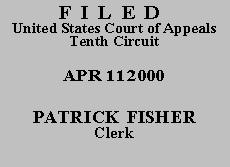

| EUGENE W. TROTTER,
Plaintiff-Appellant, v. INTERNAL REVENUE SERVICE, Defendant-Appellee. |
|
Taxpayer Eugene W. Trotter appeals the district court's grant of summary judgment in favor of the Internal Revenue Service (IRS) on his refund claim brought pursuant to 26 U.S.C. § 7422(a).(1) Because taxpayer did not pay any of the overpaid taxes within the three and a half years preceding his refund claim, he is precluded by law from recovering a refund, and we affirm.
Taxpayer's 1989 federal income taxes were withheld by his employer through its payroll deduction plan. In 1990, taxpayer and his wife received two extensions of time within which to file their 1989 joint income tax return, first until August 15, 1990, and then until October 15, 1990. On December 31, 1991, taxpayer and his wife filed their 1989 return, seeking a refund of $163.04. The 1989 return contained a notation stating "FORM 1040X WILL BE FILED SOON -- WHEN ALL RECORDS FOR 1989 ARE AVAILABLE." R. I, doc. 20, ex. B.
On January 3, 1995, taxpayer and his wife filed an amended 1040X return, seeking a refund of $3,639.65 due to previously unreported losses from a sole proprietorship and a partnership, and additional itemized deductions. The IRS denied the claim for refund as time-barred.
On October 7, 1996, taxpayer and his wife brought this action for a refund. The government moved for summary judgment on the ground that the refund claim was barred by 26 U.S.C. § 6511(b)(2)(A), which limits refunds to amounts overpaid within the three years preceding the refund claim, plus any extensions. Because the couple had not paid any of the disputed tax within the previous three and a half years, the government argued that this section precluded a refund.
The magistrate judge to whom the case was referred recommended that the government's motion for summary judgment be granted, noting first that it was doubtful whether the amended return was timely filed under § 6511(a), but that in any event the refund claim was precluded by § 6511(b)(2)(A). The magistrate judge also noted that equitable tolling is unavailable in § 6511 cases, citing United States v. Brockamp, 519 U.S. 347 (1997). Adopting the recommendation, the district court granted summary judgment and dismissed the refund action.
We review the grant of summary judgment de novo, applying the same standard as the district court. See Bullington v. United Air Lines, Inc., 186 F.3d 1301, 1313 (10th Cir. 1999). Summary judgment is appropriate "if the pleadings, depositions, answers to interrogatories, and admissions on file, together with the affidavits, if any, show that there is no genuine issue as to any material fact and that the moving party is entitled to a judgment as a matter of law." Fed. R. Civ. P. 56(c).
Taxpayer argues that the amended return, which included his refund claim, was timely filed under the IRS's instructions for forms 1040 and 1040X. He also argues that the refund claim should be held timely because he was misled by an IRS agent that filing on January 3, 1995 would be timely, he was not sent instructions regarding § 6511(b), and the requirements of § 6511(b) are buried within 8,000 pages of the Tax Code.
The government concedes that, under the rules of civil procedure, taxpayer's January 3, 1995 amended return was timely filed under § 6511(a). Thus the IRS employee was correct in so advising taxpayer. The problem is that under § 6511(b)(2)(A), the amount of taxpayer's recovery is limited to that portion of the overpaid tax actually paid within the preceding three years, plus any extensions. As taxpayer's 1989 taxes were deemed paid when due on April 15, 1990, more than four and a quarter years before the refund claim was filed, none of taxpayer's overpaid tax could be refunded.
While we sympathize with taxpayer's complaint about the complexity of the Tax Code, the court must apply the law as written by Congress. The Supreme Court has held specifically that the § 6511 limitations must be strictly enforced, and are not subject to court intervention on fairness grounds.
Section 6511's detail, its technical language, the iteration of the limitations in both procedural and substantive forms, and the explicit listing of exceptions, taken together, indicate to us that Congress did not intend courts to read other unmentioned, open-ended, "equitable" exceptions into the statute that it wrote. . . . Tax law, after all, is not normally characterized by case-specific exceptions reflecting individualized equities. . . . The nature and potential magnitude of the administrative problem suggest that Congress decided to pay the price of occasional unfairness in individual cases (penalizing a taxpayer whose claim is unavoidably delayed) in order to maintain a more workable tax enforcement system. At the least it tells us that Congress would likely have wanted to decide explicitly whether, or just where and when, to expand the statute's limitations periods, rather than delegate to the courts a generalized power to do so wherever a court concludes that equity so requires.
Brockamp, 519 U.S. at 352-53. The district court was correct, therefore, in granting summary judgment in favor of the IRS.
The judgment of the United States District Court for the District of Utah is AFFIRMED. The mandate shall issue forthwith.
Entered for the Court
Circuit Judge
*. This order and judgment is not binding precedent, except under the doctrines of law of the case, res judicata, and collateral estoppel. The court generally disfavors the citation of orders and judgments; nevertheless, an order and judgment may be cited under the terms and conditions of 10th Cir. R. 36.3.
1. This action for a refund was brought originally by taxpayer and his wife, based on their 1989 joint tax return. Taxpayer's wife is not a party to this appeal, however.